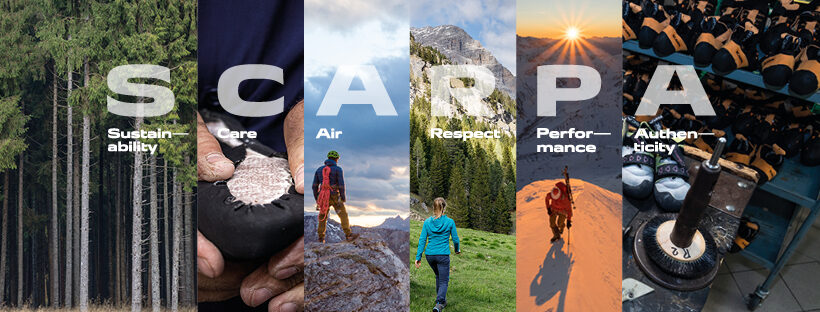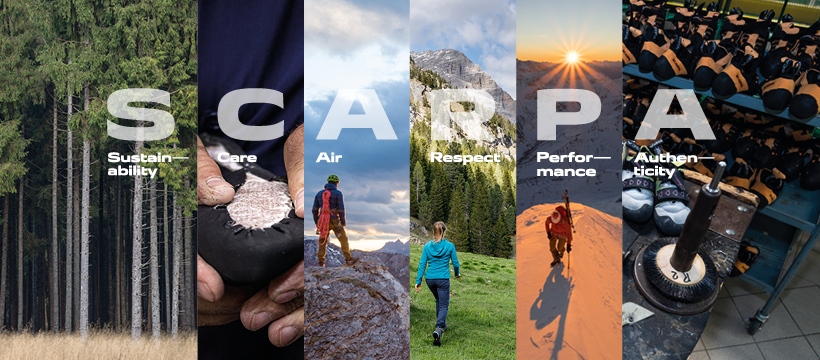July 26, 2022
We are passionate about our sports; we are passionate about boot making; we are passionate about performance.
Sustainability has guided SCARPA’s way of doing business for decades. So much so, that the Italian-based performance shoe and gear company has been saving excess plastic from shoes during the manufacturing process in a warehouse for 25 years. That’s right – overflowing containers of plastic scraps have been waiting their turn to be used. Soon, they will be made into the Maestrale ski boot for release in the fall of 2023.
This is just one example of the ways SCARPA holds itself to the highest international manufacturing standards – and has been doing so for years. It’s the little things that separate it from other outdoor brands. Its offices and main production facility in Asolo, Italy operate on 100% green power, and the heat from production processes is recirculated to heat the building too. Plus, 100% of the mountaineering line of products is made next to the headquarters in Italy, reducing the impact of transport. Since SCARPA owns 85% of its factories, they have control over the social and environmental practices used. Now you can really start to see why they’ve kept that plastic for so long: that’s exactly who SCARPA is.
Although the company is originally founded in the foothills of Italy’s Dolomite mountains, SCARPA’s North American headquarters located in Boulder, Colorado also have some impressive features. Wind energy powers the offices and distribution facility. The staff also reuse, recycle, and compost. These practices are engrained in the SCARPA culture, and if staff ever have a question, there are 16 sustainability ambassadors spread throughout the company’s departments who can be consulted for information and advice on these kinds of things.
The North American headquarters happen to lie in an area of the western U.S. that has experienced some of the worst impacts of climate change. That’s why the steps SCARPA is taking are so important now more than ever. The rivers and streams are drying up as the population demands more water than we have supply. Wildfires have ravaged forests, but also local neighborhoods. And the air quality is some of the poorest in the country.
To further highlight the need for action, SCARPA published its Green Manifesto, a clear commitment to improve the environmental and social sustainability profile of everything they do throughout the entire life cycle, from raw materials to product recycling. Known for its highly technical shoes for mountaineering, trekking, hiking, alpine running, climbing and skiing, SCARPA is ready to commit to measurable targets for a more sustainable industry.
SCARPA has several eco products that maintain the reliability and performance that has amassed customers since 1936, while minimizing environmental impact. Improved technology has encouraged their use of biodegradable and plant-based materials (even plastic made from beans grown in India!), eco leather made with less water and renewable energy, non-polluting water-based adhesives, and recycled laces, linings, footbeds, and paper packaging.
Check these out to reduce your own footprint:
- Pebax R-new – plant-based plastic (sourced from Castor bean oil) used in the Maestrale and Gia ski boots
- Mojito Bio – the first fully biodegradable product at SCARPA: a plant based upper and midsole paired with a biodegradable natural rubber outsole; will break down fully at end of life
- Several vegan shoes –
- Ski: Maestrale/GEA, F1/F1 LT, Alien, and Telemark
- Climbing: Booster, Furia Air, Quantic, Veloce, and Reflex
- Hiking: Rush and Maverick
- Trail Running: All styles
- Lifestyle: Mojito Bio and Spirit

SCARPA is doing all that it can to minimize their environmental impact in an industry with some of the worst pollution. It is clear as day in their Green Manifesto that they are committed to action. WRA is lucky to have them as a loyal partner in this work. SCARPA directly sustains our mission to fight climate change in the West, and together, we can make a difference.


